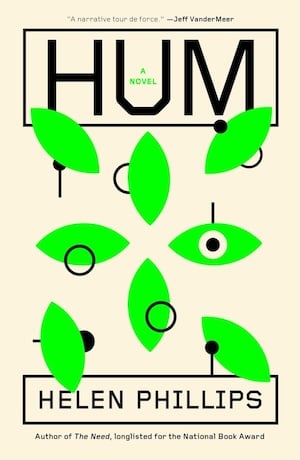A dystopian novel praising human connection
I don’t think I’ve ever read a novel that finished with an End Notes section, followed by Other Works Read. And yet that’s what Helen Phillips does at the end of her dystopian novel HUM, listing the people, articles, and books that inspired her to write the novel.
The section lists familiar names like Kashmir Hill (see my interview) and Douglas Rushkoff (see my column). One name I hadn’t heard before is Kenneth A. Gould, who’s at Brooklyn College with Phillips. Gould was the source of a couple of my favorite quotes in HUM:
The goal of advertising is to rip a hole in your heart so it can then fill that hole with plastic, or with any other materials that can be yanked out of the earth and, after brief sojourns as objects of desire, be converted to waste.
And on the subject of complicity vs. purity:
We are all villains . . . the systems only give us villainous options.
A major theme of the book is how to extract ourselves from our predicament of runaway tech, thereby finding more human connection. Amidst it all, Phillips argues, despite only having "villainous options," we still have reason for hope.

I interviewed Helen Phillips about HUM on Techtonic this week. The story is set in a city much like NYC bristling with surveillance cameras, addictive devices, ambient AI, and accelerating climate change.
- Stream the show (interview starts at 3:50)
- Playlist with links and listener comments
- Download podcast of the episode
In my comments after the interview I brought up the WHSmith surveillance store in LaGuardia airport that I wrote about in last week's column, Surveillance never sits still.
But more than that, I described what happened when I opted out of surveillance. Specifically, I asked the nice TSA agent at the airport if I could avoid getting my face scanned. This allowed the time for a coincidence to unfold that turned into a brief but authentic connection – something we could all use more of in this algorithmic surveillance age. (Hear the whole story in my comments after the interview.)
The reason I was traveling, incidentally, was to speak to a corporate audience about AI: how it's designed, the pitfalls of using it without guardrails, and what the future looks like.
If this is relevant to your organization, check out my Workshops and Seminars. Drop a note (reply to this email) if I can help.
For Creative Good members, we have a ton of extra resources on our members-only Forum:
- Arguments for a flip phone from Zadie Smith
- Two updates on surveillance glasses, from Snap and Facebook/Meta
- The car brands spying on you, detailed by Mozilla
- Three helpful explainers about the Google ads antitrust trial: 1, 2, 3
- In our cybersecurity thread, leaked therapy transcripts and a Chinese botnet controlling 200,000 devices
- In our Fun Stuff section, Ig Nobel summaries and a clever rap song visualization
Please join Creative Good to support my work on this newsletter, and to get access to hundreds of resources on our Forum.
Until next time,
–mark
Mark Hurst, founder, Creative Good
Email: mark@creativegood.com
Podcast/radio show: techtonic.fm
Follow me on Bluesky or Mastodon
P.S. If someone was nice enough to send you this, you might also like to subscribe to this newsletter.